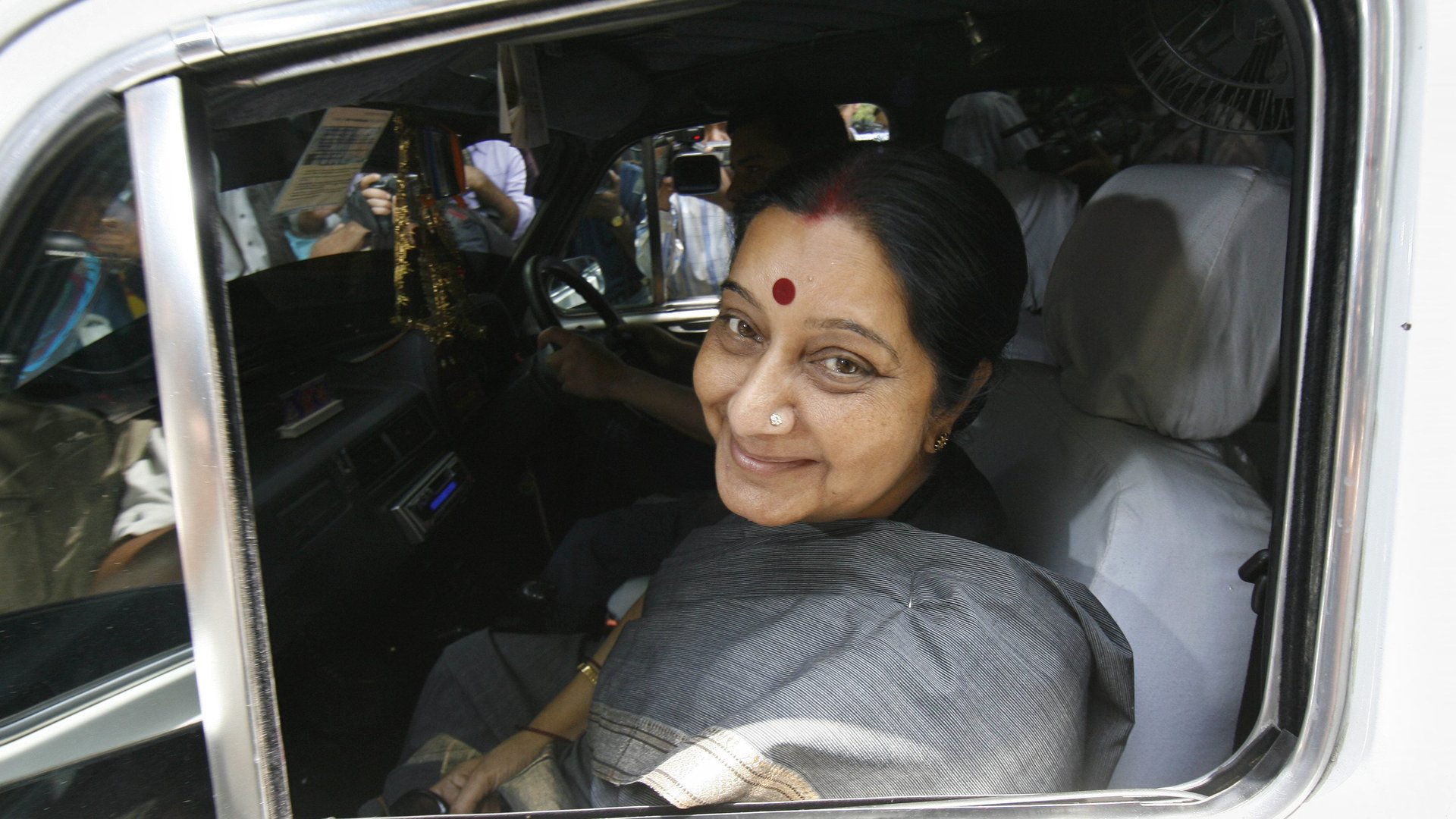Sushma Swaraj, India’s former foreign minister who reached out to people, has passed away
India’s former external affairs minister Sushma Swaraj, often lauded for bringing a rare humane touch to that office, passed away yesterday (Aug. 6), after suffering a cardiac arrest. She was 67.


India’s former external affairs minister Sushma Swaraj, often lauded for bringing a rare humane touch to that office, passed away yesterday (Aug. 6), after suffering a cardiac arrest. She was 67.
Swaraj , a senior leader of prime minister Narendra Modi’s Bharatiya Janata Party (BJP), was brought to the All India Institute of Medical Sciences (AIIMS) in New Delhi around 9:30pm local time and was immediately taken to the emergency ward.
Only a couple of hours before her demise, Swaraj had tweeted thanking Modi for his government’s move to revoke Jammu & Kashmir’s special status and bifurcate the restive state.
As external affairs minister during Modi’s first term (2014-19), she earned huge admiration as an easily-accessible minister, helping distressed Indians with an efficient social media outreach. Swaraj had chosen not to contest the 2019 general elections on account of her ill-health.
Political leaders across the country rued her demise.
Expressing grief, Modi tweeted that a “glorious chapter in Indian politics comes to an end.”
Union home minister, Amit Shah, also took to Twitter to condole the death of the BJP stalwart.
Reactions and condolences started pouring in from leaders across party lines, the international community, and her fans on social media.
A fierce politician of many firsts
Swaraj, who became the youngest-ever cabinet minister in the Haryana government in 1977, had many firsts to her credit, including being the first woman chief minister of Delhi, and the first woman spokesperson for any national political party in India.
A supreme court lawyer from Haryana, Swaraj was elected seven times as a member of parliament and three times as a member of the legislative assembly. She entered politics through the right-wing students’ organisation Akhil Bharatiya Vidyarthi Parishad (ABVP). She later joined the BJP and played a crucial role in the 1990s to strengthen the party.
In the Atal Bihari Vajpayee-led government in 1996, which lasted only 13 days, Swaraj was the information & broadcasting minister, and got a cabinet portfolio again after Vajpayee led the BJP to power in 1998.
Swaraj also held the portfolios of telecommunications, health & family welfare, and parliamentary affairs in the union cabinet.
Not unknown to controversy
Swaraj was known as a fiery orator, who wasn’t afraid of speaking her mind or courting controversy.
In 2004, when the Indian National Congress-led United Progressive Alliance (UPA) came to power, she threatened to tonsure her head if the Italy-born party president Sonia Gandhi became prime minister. However, the situation didn’t come to pass as Gandhi chose Manmohan Singh for the post.
That wasn’t the first time Swaraj had expressed her dislike for the foreign.
In 2001, as an external affairs minister in Atal Bihari Vajpayee’s government, she advocated a ban on France’s Fashion TV, saying it was not in sync with Indian culture.
As a health minister in 2003, she dissented against the airing of condom advertisements on television. Swaraj ensured that national broadcaster Doordarshan stopped airing ads on contraceptives.
Swaraj, who was seen as a protégé of veteran BJP politician LK Advani, was among the leaders who were opposed to Modi as a prime ministerial candidate in the 2014 general elections. On this count, she was sidelined along with senior BJP leaders like LK Advani and Murali Manohar Joshi. Swaraj, though, became the external affairs minister after Modi’s thumping victory.